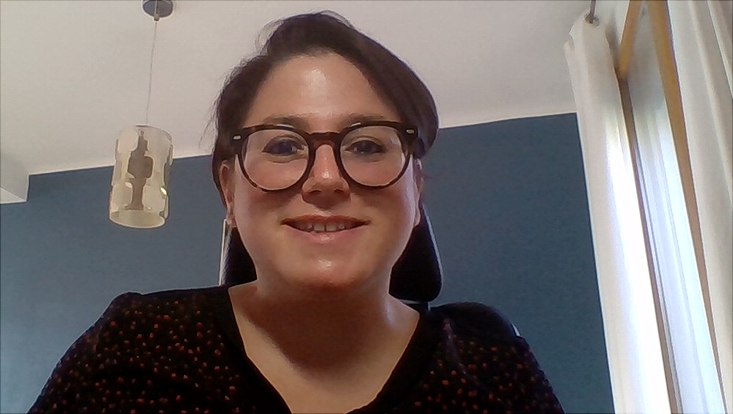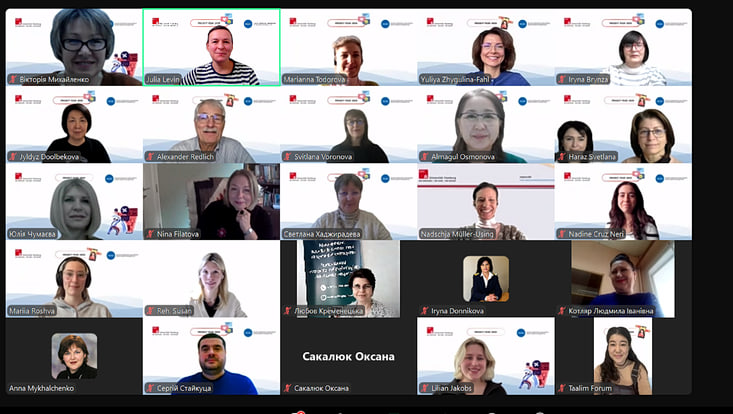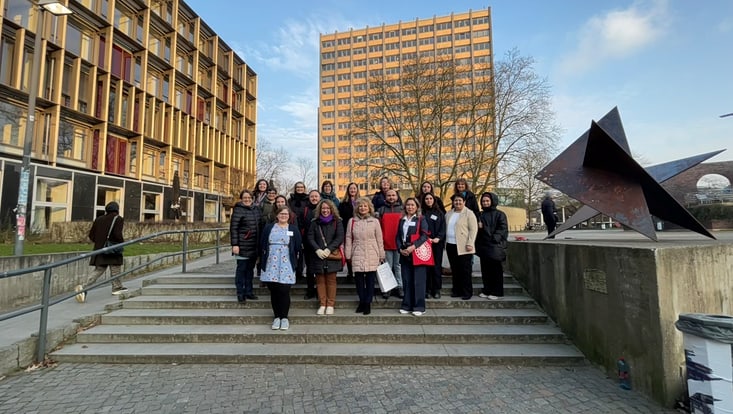"I am so happy to be here!"
11 November 2021

Photo: Leininger-Frézal
(englisches) Interview mit Caroline Leininger-Frézal, die im Rahmen des VirtEx-Projektes für drei Wochen im Oktober/November an der Fakultät für Erziehungswissenschaft war
Caroline Leininger-Frézal is associate professor at the geography department of the Université de Paris. Topics of her research are in the field of didactics of geography, virtual excursions, education to sustainability and social burning issues like migration. Since September 2020 and together with professor Sandra Sprenger, Head of Geography Education Group at the Faculty of Education, she was head of the project “VirtEx – Virtual Excursion Didactics towards Sustainability” funded by the DAAD; the project is finished since the end of September. Caroline Leininger-Frézal is currently visiting the Faculty – this hasn’t been possible during the whole project due to the pandemic. We got the chance to meet Caroline on one of her first days in Hamburg.
Referat Internationales: Caroline, this is not your first visit to Universität Hamburg and to the Faculty of Education, when and why have you been here before?
Prof. Caroline Leininger-Frézal: In fact, I have been at the Faculty of Education for a one-week stay shortly before the pandemic hit, in January 2020. That was a guest lecture funded by Erasmus – and without it, the VirtEx Project wouldn’t have been possible as this face-to-face meeting laid the foundations for the cooperation between Sandra Sprenger and me. International collaboration is easier with a physical get-together
Can you tell us a bit more about this cooperation?
With pleasure. The VirtEx Project aimed to develop a theoretical framework and teaching concept for virtual excursions that could be incorporated in the geography school curriculum or used for the exchange with partner schools. Field trips are very significant for geography education – but, as we have seen, sometimes real excursions aren’t possible. Or there may be factors hindering students’ physical mobility. Different formats such as videos, GIS applications, digital maps and virtual reality have been used to develop knowledge in the field of intercultural sustainability. Online courses at both universities in geography education were part of the project. It is a pity that the students couldn’t meet in person but only virtually. Nevertheless, virtual excursions for the cities of Hamburg and Paris have been done.
The VirtEx Project has just come to an end – will this be your final stay in Hamburg?
I hope not! In fact, this time, I will be in Hamburg for three weeks; Sandra has also visited me at the Université de Paris in September – that was the least physical exchange we could realize during this project. Due to travel restrictions – in Paris, we partly even had to stay in a 1km radius from our homes so even smaller excursions weren’t possible – the student exchanges planned for VirtEx could not be realized but at least we wanted to visit each other on our home campuses. And I hope I will come again – Hamburg is such a nice city, it reminds me a lot of my home town Lyon in France. I find it very refreshing to be here. And, of course, we want to go on with the collaboration on the topic of virtual excursions in geography education. We are just now enlarging the project to a third partner in Israel. This time, the topic will be on water.
Let’s hang on with the VirtEx Project for one more moment. The topic of the virtual excursions designed in this project was intercultural sustainability. Does this mean, approaches to sustainability and sustainable cities aren’t the same in Germany and in France?
No, they aren’t. They may, of course, also differ in different parts of Germany (and France), but one can say that the general approach to the topic of sustainability is also a different one in our two countries. I think Germans students have a more integrated focus on sustainability whereas the French see it from a holistic point of view.. The approach to teaching geography education for sustainable development is also very diverse. Therefore, I am especially glad to be here and to have been here before as we can learn from each other. I gained a lot from Sandra’s way of teaching. And this brings me back to what I said at the beginning: if we collaborate internationally and do research projects, it is always important to keep in mind the intercultural aspect of a research topic – so to say the point of view from where someone is talking. And this point of view can be understood best while being there, experiencing the other and the otherness. Virtuality cannot fully substitute physical personal experience and exchange. That is why I am so happy to be here because it really makes a difference to see (in terms of experience) another system, another approach, another university. I hope we can go on with our getting to know each other and learning from each other. Because, and I want to stress this: projects like this one need time. We need time to understand each other, get accustomed to each other’s way of thinking, working and teaching – only then we can share this knowledge with our students.
You are so right – we are all very glad that personal contacts are possible again! We wish you all the best for the continuation of your research and collaboration – and thank you for your time.
For further information on the virtual excursion projects, please visit this site. There you can also find the developed virtual excursions.
For further information on Caroline Leininger-Frézal’s CV, please visit this site.


